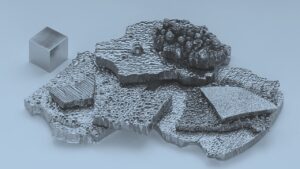A proprietary molten-salt electrolysis (MSE) process originally designed for battery manufacturing has now been re-optimized for North America’s first operational cobalt-refining plant. The DirectPlateTM MSE technology developed by Xerion Advanced Battery Corp. (Kettering, Ohio; www.xerionbattery.com; see Direct molten-salt electroplating cuts battery costs, Chem. Eng., January 2024) has been scaled up for a cobalt-refining pilot plant in Dayton, Ohio, which recently began operations. Broadly, DirectPlateTM uses molten-salt electroplating to dissolve, purify and deposit metals in a single step. The process operates at relatively low temperatures compared to traditional mineral-refining methods, and incorporates a closed-loop rinse system that reduces water consumption.

Source: Xerion
“To develop the molten-salt technology for batteries, we did a lot of foundational work in terms of finding the right combinations of molten salts and developing sensors that could survive the highly corrosive environment. Because we can use essentially the same process for cobalt, we’ve been able to scale up very fast,” says John Busbee, Xerion CEO and co-founder.
To adjust the DirectPlateTM process for cobalt refining rather than manufacturing entire battery electrodes, several process parameters have been adjusted that further improved scaleup economics. “For batteries, you have to have micron-level precision and uniformity over the entire battery system, whereas we can simply grow cobalt either as a foil or powder,” says Busbee. This means that the plating system can be run at higher speeds, enabling a greater processing capacity for cobalt.
Currently, says Busbee, there is no significant production of refined cobalt within the U.S. outside of Xerion’s Dayton scaleup facility. The plant can refine crude cobalt hydroxide or end-of-life batteries with cobalt extraction rates higher than 98%, with a purity of 99.9%. This facility is currently operating a 5-ton pilot line, and within the next few months, a 50-ton production line will come onstream. “Next year, we will have our first fully commercial pilot plant coming online, which will produce 2,000 tons of alloy-grade cobalt metal,” adds Busbee.
Moving forward, Xerion is also looking at applying its technology for other metals and other critical minerals, and has demonstrated extraction of copper hydroxides, copper sulfides, nickel sulfides and gallium oxides. They are also investigating smaller-scale strategic critical metals like antimony and germanium.